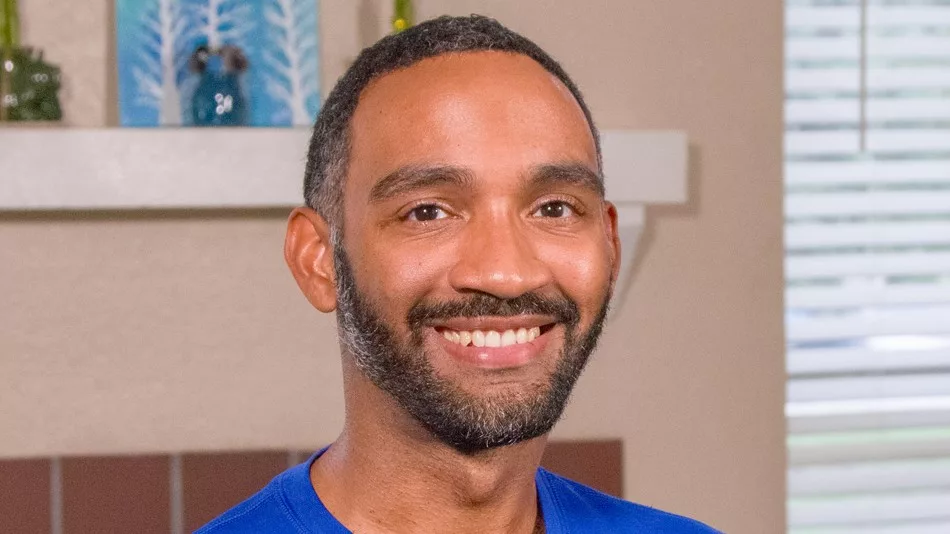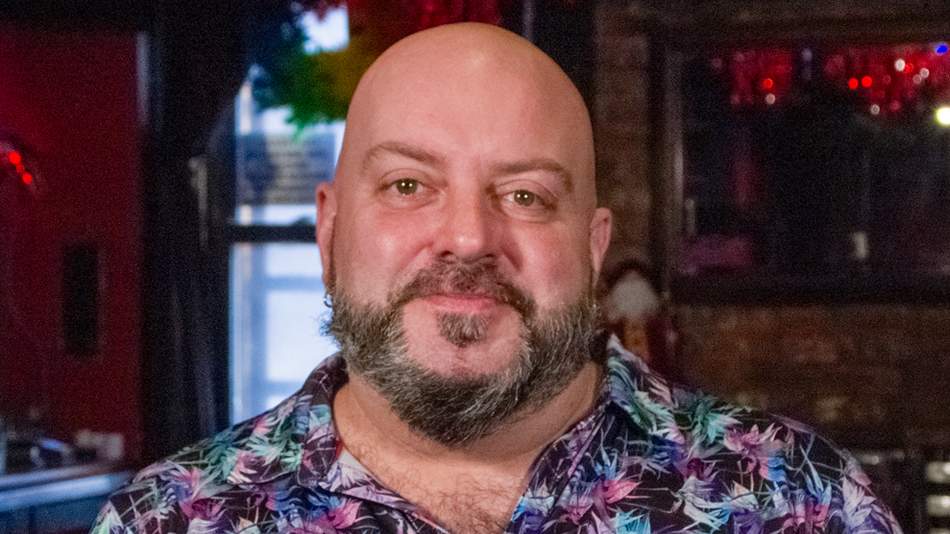
Not a lot of people go to the grocery store on weekday nights. A few people duck in after work, grab some bread or a gallon of milk, and zip out of there as fast as possible. Tonight, my lane is one of two still open, not counting the self-checkout machines which are, as always, more popular than we are. I stand under the fluorescent lights and listen to the blandly inoffensive pop music they’re piping in. All the songs are about romance. My depression helpfully reminds me that I’m a 23-year-old virgin who’s kissed neither boy nor beard. I tell my depression to shut up, and fiddle with the cash register. My job is a brainless job, but it’s not so bad. It gives me time to daydream, and think about where my life is headed, and where I want it to go.
If you’d asked any of my elementary school teachers where they thought I’d be in fifteen years or so, I doubt any of them would guess “high school dropout working as a checkout boy.” Up to about sixth grade, I was the star pupil of every class. Straight A-pluses, except when I just got A’s. I didn’t just want to be an astronaut, I went to Space Camp and memorized whole episodes of Cosmos and shocked adults with my in-depth understanding of black holes. I was Hermione Granger on crack.
I’d always dealt with some amount of bullying, but for some reason, it seemed to get worse in middle school. Maybe it was because the school was bigger, so there were more bullies. Maybe it was because I started to realize, deep down inside, that when they called me a fag, they were right. I came out to myself in seventh grade, and told no one, but somehow they seemed to sense it. I don’t know if I subconsciously sent out gay signals, or if their gaydar was so trigger-happy that they got a few lucky guesses along with a whole slew of false positives (that’s a distinct possibility; middle-schoolers call everyone gay), but it felt like suddenly every bully in the school was drawn to me like sharks to blood.
About that time, I started sinking into depression. I dreaded going to school. I’d go into greater detail regarding the bullying, but you all probably know the story by now. The name-calling, the beatings, the teachers’ total lack of concern – you know, the classics. My grades dropped like a stone until I was barely passing anything. By the time I got to high school, I’d completely given up on doing well in school, making friends, or being happy. (Just in case you’re wondering, no, I didn’t go to that Littleton, CO, high school. And for the record, it’s not even technically located in Littleton, so quit blaming my admittedly crappy town for the sins of Columbine Valley.)
Maybe if I’d known then that I could have graduated in three years, or gone to Bard College at Simon’s Rock after sophomore year, or transferred to the hippie alternative school half an hour away, or just hung in there until I could escape to some east coast liberal arts college where everyone is gay or wants to be, I’d have kept going. But at the time, I didn’t know about any of those options. My teachers and guidance counselors told us all, “College will be just like this, only harder” – repeating that exact sentence again and again like it was a mantra. I guess they wanted to scare us into working hard, but it just made me lose all hope in ever escaping the cycle of harassment. It probably didn’t help that my image of college life came from movies like Animal House and Revenge of the Nerds, giving me the impression that the only difference between college and high school was that the bullies would be wearing togas instead of letter jackets. I ended up dropping out and getting a G.E.D. True to form, I got a perfect score on my G.E.D. test. My parents hung my results up on the fridge and left them there for months. I didn’t exactly give them anything else to be proud of me for.
Even though I was now free of the bullies, dropping out didn’t make me any happier. I found I didn’t need jocks to beat me up; they’d obliterated my self-esteem to the point where I’d happily do the job for them. Loathing myself for every perceived fault became like an addiction. Depression is sneaky like that. It’ll convince you to hate yourself for being gay, and when you get over that, it’ll convince you to hate yourself for being too closeted (You’re lying to the people you love!) or too out (You’re making people uncomfortable!) or not perfect enough (You’re making gays look bad!). And when you start to wake up and see the wreckage it’s made of your life, it’ll convince you to hate yourself for hating yourself. (If you were stronger, you wouldn’t be so sad all the time.) But the most sadistic trick it pulls is convincing you it doesn’t exist. I was clinically depressed for years before I sought any treatment, because I listened as it told me, You’re not depressed. You’re just lazy, and you’re using depression as an excuse to not do anything. You just want people to feel sorry for you. You just love feeling sorry for yourself. You don’t need a therapist or drugs; you just need to grow up and be a man.
I drifted apart from the few friends I had in school. I came to fear summers and holidays, when they’d come home and I’d run into them, hear about their happy lives at college or their volunteer work or their internships or their exciting jobs, and face the dreaded question, “So what are you doing with yourself?” I didn’t even have a dramatic, Oprah-worthy tale of surviving on the mean streets of Denver by selling my body for meth. I just hung around the suburbs and hated myself for the better part of a decade. I got lousy minimum wage jobs and lost lousy minimum wage jobs. I got on antidepressants and got off, and got on other antidepressants, and switched therapists a few times. Some days I woke up and the first thing that popped into my head was “I hate myself,” and I’d be contemplating suicide by breakfast. (Incidentally, Suicide by Breakfast would make a good name for an emo band.) I never did attempt, though, partly because I was afraid of how much it would hurt, and partly because I knew it would destroy my parents. I considered admitting myself to a mental health facility, but I didn’t do that, either. My six-word memoir: “I thought about it, but didn’t.”
A few months back, I enrolled in community college, which everyone around me applauded as a major step forward. (I’m just embarrassed their standards for me are so low.) I’m almost one semester in, and even though I still don’t know what to major in or what career path I’m working towards, I’m starting to see a light at the end of the tunnel. I’m getting good grades in my math class, which I never thought I’d be able to do. I could transfer to a four-year college, get a real bachelor’s degree. I just might end up going to one of those quirky east coast liberal arts colleges after all.
An African-American guy about my age comes up to my lane and unloads a handful of groceries on the belt. He is a walking greatest hits compilation of everything I find attractive in a man. Tall and slender, with broad shoulders. A dark red scarf tucked into his perfectly-fitting black pea coat. His movements are smooth, gentle. He’s slightly effeminate (not the loud and bitchy kind, more the graceful and sophisticated kind). Rectangular glasses compliment his square jaw and high cheekbones. I’m afraid to look directly at him lest I turn bright red and stammer like an idiot. So my eyes bore holes in his groceries as I scan them and mumble out my script.
“How are you doing tonight?”
“Well. And you?”
I have no idea what to say. He said “well” instead of “good.” No one does that. He asked me how I was doing. No one does that either.
“Great,” I lie, because when you ask your friendly neighborhood register biscuit how he is, you’re generally not looking to hear, “Crippled by clinical depression! And you?”
I continue my mumble-script. Does he have a membership card? No. Does he want one? Of course not, no one does.
SAM: I should flirt with him.
DEPRESSION: He’s probably not even gay.
SAM: Are you kidding? He has to be gay. Look at the way he walks. Listen to his voice. And for God’s sake, I’m ringing up his appletini mix! I should work that in somehow. Cheekily ask him if he needs someone to help him drink those appletinis.
DEPRESSION: Great idea! Then he can stare blankly at you and say he’s making them for a party. Or drinking them with his boyfriend. Or just with someone who isn’t a tangled knot of neuroses.
SAM: I’m getting better.
DEPRESSION: I wonder how many dates it would take for him to figure out what a loser you are? Are you even emotionally stable enough for a relationship right now?
His groceries all fit into one bag. I wonder if it means something that he didn’t go to the self-checkout lane like all the other evening customers? Or is that just wishful thinking? I take a chance, work up all my courage, and smile at him as I hand him his bag. He actually smiles back. I might have a heart attack.
I watch him as he leaves. He strides out of the store like he’s on a catwalk, poised, elegant, confident.
DEPRESSION: He probably thinks you’re racist because you were so unfriendly.
SAM: I smiled at him!
DEPRESSION: After acting really nervous and uncomfortable around him the whole rest of the time.
SAM: He smiled back at me! Maybe he thinks I’m cute. Maybe he’ll come back sometime soon.
DEPRESSION: Yeah, with his boyfriend. And he’ll tell him, “Let’s not go to that cashier. That’s the racist one.”
SAM: Oh, go fuck yourself. You ruined my life. I’m not listening to you anymore.
My depression tells me that this story is too long, too self-indulgent, too self-pitying. No one will want to read it. The dark humor is too dark to amuse anyone. The other stories on this website are way better. A story that is literally about folding laundry is more interesting than this story.
I keep writing.
Bit by bit, I’m learning that I’m not as worthless as I thought I was. I know that someday, I want a husband, and a house, and a cat. Maybe two cats. I’m starting to grasp that I could make that happen. I could have that, and even deserve it. I just have to go one step at a time. One semester at a community college. One smile at a cute boy. One story on a website.
Someday, somehow, I’ll be more than this.






Share